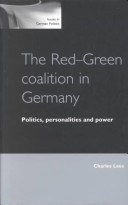Issues in German Politics
1 total work
This text provides a perspective on the politics and personalities of post-war Germany's most unstable - and apparently unpredictable - national government to date. The author uses previously unpublished research into Red-Green coalitions in the German Lander in order to understand more clearly the nature of the pressures acting upon Germany's first national coalition between the Social Democrats and the Greens. Charles Lees argues that the Red-Green coalition is best understood as part of an ongoing process of political co-operation between two distinct and often antagonistic parties. Grounded and introduced in the context of recent work on coalition theory and public policy analysis, the book examines the trail of political trial and error that has led the two parties from the mutual suspicion of the early 1980s to being partners in national government today. Drawing on the political history of Red-Green coalitions in Germany, the author explains why Chancellor Schroeder's 1998 election triumph provoked such excitement and why his government's subsequent political travails could have been predicted.
